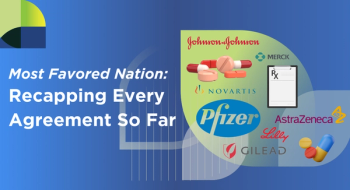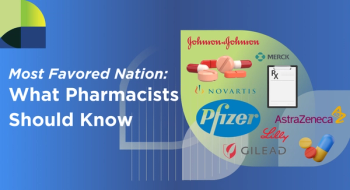
- January/February 2017
- Volume 8
- Issue 1
Value-based Contracting 2.0: Is Specialty Pharmacy Ready for its Shot at the Spotlight?
Specialty pharmacies that offer effective medication therapy management and support are best suited to serve as arbiters of the next generation of value-based contracts.
In December 2016, QuintilesIMS reported that US spending on prescription medications will reach upwards of $675 billion by 2021.
The pricing pressure on manufacturers is expected to grow along with the demand that specialty therapies, in particular, demonstrate positive outcomes in real-world conditions, as the shift from fee-for-service to value-based care accelerates, regardless of future shifts in health care policy.
To date, value-based contracts among pharmaceutical manufacturers and payers have not achieved the adoption and success levels necessary to drive significant systemic change, because many of these agreements cover only one drug, and/or rely on simple volumetric math as the arbiter of contractual conditions and payment.
The concept of contracts that base reimbursement on the broader notion of improved patient outcomes, in addition to drug efficacy, is compelling and could quickly gain traction. Manufacturers stand to benefit from pharmacy and medication therapy management partners with proven capabilities in improving adherence and patient engagement that result in positive health outcomes, such as sustained virologic response, thereby realizing the full financial potential of their specialty therapies.
Manufacturers appear open to advancing and improving value-based contracts. In a November 2016 column for Forbes, Novartis CEO Joseph Jimenez wrote, “We believe in the efficacy of our products, and by collaborating with payers on solutions for reimbursement, we hope to help start a shift toward value pricing in the health care system.
We want to be rewarded for the tangible outcomes our products provide patients, not for simply selling pills.” Specialty pharmacies and medication management providers that offer effective medication therapy management, along with support teams that deliver valuable patient care and report real-world outcomes, are best suited to serve as arbiters of the next generation of value-based contracts.
Here’s why:
The ideal stakeholders to arbitrate value-based contracts
Nearest neutral party
First and foremost, the specialty pharmacy or medication management provider is patient-focused, and is the nearest neutral party to a value-based contract (assuming the absence of a limited distribution relationship).
The most robust and competent of these organizations improve both variables in the value equation—outcomes and costs–for every member of the continuum: patients, prescribers, manufacturers, and payers.
Expertise of the clinical pharmacist
Of equal importance are the clinical pharmacists capable of acquiring, generating, and analyzing outcomes data critical to the adjudication of true value-based contracts. They also possess the pharmacologic knowledge critical to side effect mitigation (a contributor to adherence and outcomes), and for conducting appropriate medication reconciliation for polychronic, polypharmacy patients. These individuals comprise roughly 20% of the population responsible for 80% of health care spending.
Familiarity with all parties
Third, specialty pharmacists interact with all parties concerned: patients, prescribers, manufacturers, and payers. Most importantly, they have a clear line of sight into the patients’ living rooms, kitchens, and medicine cabinets that the manufacturers, prescribers, and payers do not. This enables us to understand the whys of medication non-adherence, and gives us the ability to change what is needed in order to affect and support individualized changes that improve adherence, outcomes, and value derivation for all parties.
Trusting patient relationships
Improving adherence requires a trusting relationship with the patient. We have discovered through more than 15 years of patient service that these patients tell us things they have not even told their prescribers. Building trusting patient relationships takes time and dedicated, patient-focused teams.
Data systems
While electronic medical record systems have a long way to go to reach needed levels of efficiency and interoperability (especially from the provider’s perspective), specialty pharmacies and medication management providers are uniquely positioned to collect minimum levels of data needed to fairly adjudicate value-based contracts.
These data include, but are not limited to, challenges in obtaining access to medications and speed-to-therapy, adherence assessment, costs, and efficacy of therapy. These systems should enable ease of access to data sources from multiple stakeholders, and to analysis that all parties can understand.
Communication skills
At times, it seems payers, manufacturers, prescribers, and patients speak different languages. Placing the highest priority on patient outcomes is a good first step in building a dialogue everyone can embrace and understand. Patients are not concerned with a drug’s market share. Similarly, providers have neither the time or resources to identify payers’ prior authorization criteria and complete complex, sometimes lengthy forms.
Manufacturers assume costs in research and development that are not always fully known to other stakeholders. If a specialty pharmacy or medication management provider is going to play a leading role in value-based contracts, the responsible specialty pharmacy team members and leadership are going to need to be well versed in each party’s language and top interests, and to demonstrate significant experience with productive interactions with each stakeholder.
Strength in leadership
There will be many patient lives and millions of dollars at stake in the next generation of value-based contracts. At the end of the day, you can rest assured that the C-suite level will be sitting at the table with top executives from both payers and manufacturers during the design, negotiation, implementation, and adjudication of value-based contracts should a specialty pharmacy or medication management provider choose to accept the challenge of playing a leading role.
While improving medication adherence is health care’s greatest divide and greatest opportunity, the opportunity to help develop and implement the next generation of patient-centric, value-based contracts is one that could move the right specialty pharmacies and medication management providers out of the shadows of care. This will allow them to demonstrate real leadership in the value-based health care spotlight to the benefit of all concerned parties. 
Articles in this issue
almost 9 years ago
Medical Benefit Specialty Drug Management–A Call to Actionalmost 9 years ago
Behavioral Analytics: Key to Shutting Down the Medicare Part D ATMalmost 9 years ago
Late-Stage Pipeline Review for Multiple Sclerosis Treatmentsalmost 9 years ago
Should Specialty Look at Mobile Health?almost 9 years ago
Specialty Pharmacy’s Role in the Changing Face of Health CareNewsletter
Stay informed on drug updates, treatment guidelines, and pharmacy practice trends—subscribe to Pharmacy Times for weekly clinical insights.


























